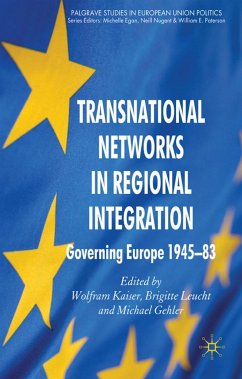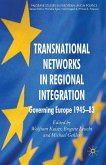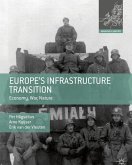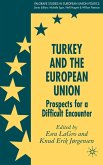Contributors to this volume use newly available sources to challenge the widely held assumption that European integration developed in the 1980s. They demonstrate how various networks influenced constitutional choices and policy decisions after World War II.
Shows that networks in European integration governance were not a phenomenon that developed in the 1980s out of a 'hollowing out' of the nation-states in the 1970s. Based throughout on newly accessible sources, the authors discuss various networks and show how they contributed to constitutional choices and policy decisions after World War II.
Shows that networks in European integration governance were not a phenomenon that developed in the 1980s out of a 'hollowing out' of the nation-states in the 1970s. Based throughout on newly accessible sources, the authors discuss various networks and show how they contributed to constitutional choices and policy decisions after World War II.
'This work undoubtedly succeeds in superseding many more simplistic interpretations of integration, and is therefore compelling reading for anyone wishing to gain a more sophisticated understanding of the process of European construction. Indeed, it leaves one wishing for more.' - English Historical Review
'This fascinating volume provides compelling evidence for the vigour and variety of political networks in and around the European integration process from the early post-war years onwards. Contemporary social scientists have much to learn from this rich historical research about the framing and shaping of European policies, politics and law.'
- Helen Wallace, Centennial Professor, London School of Economics and Political Science, UK
'This is a wonderful addition to the literature on the complex history of European integration governance. The editors have put together a collection of well-researched and insightful essays that address the evolution of various transnational networks that have helped make Europe the complex entity it is today. An added strength of this volume is the inclusion of an analysis of transatlantic networks which adds a broader dimension to our understanding of the development of European integration. A superb book!'
- Jussi Hanhimäki, Professor of International History and Politics, Graduate Institute of International and Development Studies, Geneva, Switzerland
'This impressive volume brings togethera new generation of contemporary historians of European integration who locate the dynamics of integration in transgovernmental and transnational governance networks. Abandoning the state-centrism still present in much of the writings on European integration by historians and political scientists, the contributions to this book are interested in studying the origins, evolution and impact of political networks in an era often claimed to be dominated by the omnipotent nation-state.'
- Berthold Rittberger, Professor of Political Science and Contemporary History, University of Mannheim, Germany
'This fascinating volume provides compelling evidence for the vigour and variety of political networks in and around the European integration process from the early post-war years onwards. Contemporary social scientists have much to learn from this rich historical research about the framing and shaping of European policies, politics and law.'
- Helen Wallace, Centennial Professor, London School of Economics and Political Science, UK
'This is a wonderful addition to the literature on the complex history of European integration governance. The editors have put together a collection of well-researched and insightful essays that address the evolution of various transnational networks that have helped make Europe the complex entity it is today. An added strength of this volume is the inclusion of an analysis of transatlantic networks which adds a broader dimension to our understanding of the development of European integration. A superb book!'
- Jussi Hanhimäki, Professor of International History and Politics, Graduate Institute of International and Development Studies, Geneva, Switzerland
'This impressive volume brings togethera new generation of contemporary historians of European integration who locate the dynamics of integration in transgovernmental and transnational governance networks. Abandoning the state-centrism still present in much of the writings on European integration by historians and political scientists, the contributions to this book are interested in studying the origins, evolution and impact of political networks in an era often claimed to be dominated by the omnipotent nation-state.'
- Berthold Rittberger, Professor of Political Science and Contemporary History, University of Mannheim, Germany








